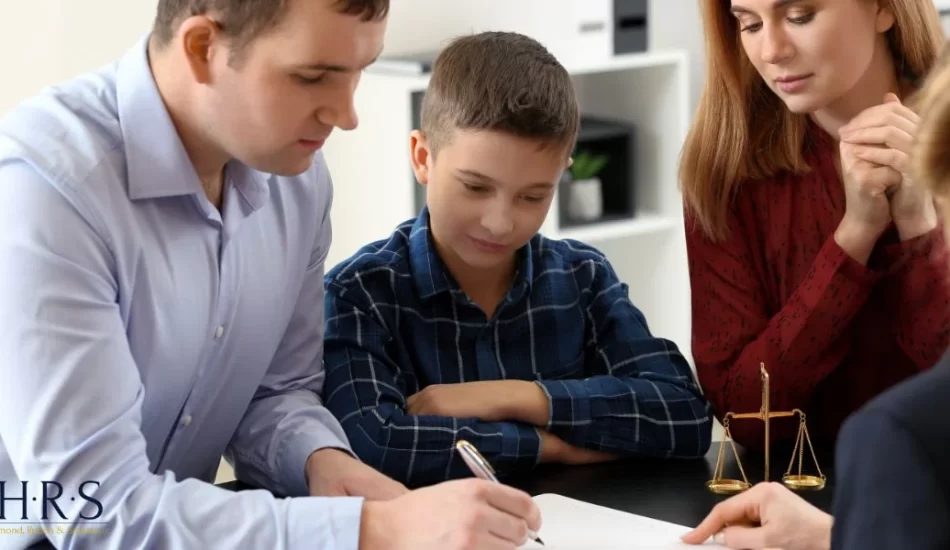Legal Decision-Making in Arizona 2023 – All You Need to Know

Deciding which parents have legal decision-making power can be a difficult part of divorce proceedings. This can be made harder if it is part of a contested divorce and there are disagreements on who can make decisions for the children of the former couple. Understanding the Arizona legal decision-making process can help you plan ahead when making a parenting plan, making it easier for your children and the rest of your family.
What Is Legal Decision-Making?
Legal decision-making is an important aspect of family law. It is often determined when two parents develop a parenting plan for their divorce proceedings. This plan outlines how much time the child spends with each parent and how they are taken care of after the parents are divorced. If a parent has legal decision-making power, they are able to make non-emergency decisions for their children.
Sometimes, both parents are granted legal decision-making power. This is called joint legal decision-making, and each parent’s opinion is considered equal in this case. If one parent is deemed unfit to make decisions for their children, the other parent might have sole legal decision-making power. Ultimately, however, each parenting plan is different and follows different rules on how children are taken care of.
Is Legal Decision-Making the Same as Parenting Time?
Legal decision-making status and parenting time are both detailed in a parenting plan, but they are not the same thing. Parenting time dictates how much time a parent spends with their child on a routine basis. During this time, they are responsible for the needs of the child, but the other parent could still have legal decision-making power if the two parents are jointly responsible for the child.
What Custody Plan Is Right for My Family?
A parenting plan is a thorough court document and doesn’t come naturally to many parents. Here are a few things to consider when determining how much parenting time or decision-making power each parent has:
- A Child’s Age and Stage of Life: Arizona does not have a minimum age requirement for a child to express custody preferences. That being said, a child’s age and maturity level might impact their needs and desires for parenting time. Another thing to consider is the child’s attachment level to each of their parents.
- Family Context: It’s important to understand how legal decision-making might affect a child who has brothers or sisters who may live in or outside the home.
- Parental Details: If one parent lives significantly far away from the other, it might be more difficult for both parents to have joint legal decision-making power. Conflicting schedules might also impact the parents’ ability to communicate effectively with each other.
- Custody Exchanges: One of the most important things that needs to be detailed in a parenting plan is how a child is expected to switch from one parent’s home to another. These details include transportation expectations, drop-off locations, and the potential of external childcare, like babysitters.
- Unique Situations: Every family is different. If the child requires different arrangements or one parent has a history of violence and/or abuse, it might impact their legal decision-making status.
It’s important to create a comprehensive parenting plan to make sure that everyone agrees on all aspects. Working with a family lawyer can help you avoid costly errors or remember to add crucial details.
Next Steps
Once you have created a parenting plan and determined the legal decision-making status of both parents, you can then file these papers with the court. Be sure to make several copies of your documents in case you need to refer back to them later. After they are successfully filed, you need to serve the papers to the other party. If you are working with an attorney during this process, they can make sure your documents are filed correctly with the court.
The other party has 20 days to respond if they live in Arizona and 30 days if they live outside the state. If they do not respond within this timeframe, it is assumed that they do not disagree with the information you provided. This means that you can then file papers with the court, documenting this lack of response. After this, the court can move forward with your legal decision-making request.
FAQs
Q: What Does Legal Decision-Making Mean in Arizona?
A: Legal decision-making is similar to legal custody. In Arizona, a parent with legal decision-making power can make certain decisions on behalf of their children, including what schools they attend, where they receive non-emergency medical care, and what extracurricular activities they participate in. This status is usually granted when parents draft a parenting plan that details visitation, custody, and other important details about childcare in a divorce.
Q: What Is an Example of Legal Decision-Making?
A: Some examples of choices that legal decision-makers decide on are where their child goes to school, what type of extracurricular activities their children participate in, and where their child goes for non-emergency medical visits. Legal decision-makers can also decide if the child participates in religious activities and whether the child goes on vacation.
Q: What Are the Types of Legal Decision-Making?
A: There are two different types of legal decision-making: joint and sole legal decision-making. If parents participate in joint legal decision-making, then they collaborate in making decisions for their child. In this arrangement, neither parent has more say over the other. In sole legal decision-making, only one parent is allowed to make these decisions for their child.
Q: Who Should Be a Decision-Maker?
A: In some cases, both parents are joint legal decision-makers. This can work well if both parents communicate with each other and are invested in their child’s well-being. However, if one parent struggles with addiction or unregulated mental health issues, it might not be wise for them to have legal decision-making power. Sole legal decision-making might also work better if one parent lives far away from the child or if there is evidence of domestic abuse or violence.
Work With a Supportive Team
The attorneys at Glazer, Hammond, Ruben & Smets, PLLC, can provide personalized results for you and your family. Jennifer Ruben has litigated for over 20 years and is passionate about advocating for her clients in family law. Let the legal team at Glazer, Hammond, Ruben & Smets, PLLC, hear your story and help you develop an effective legal decision-making and parenting plan.



